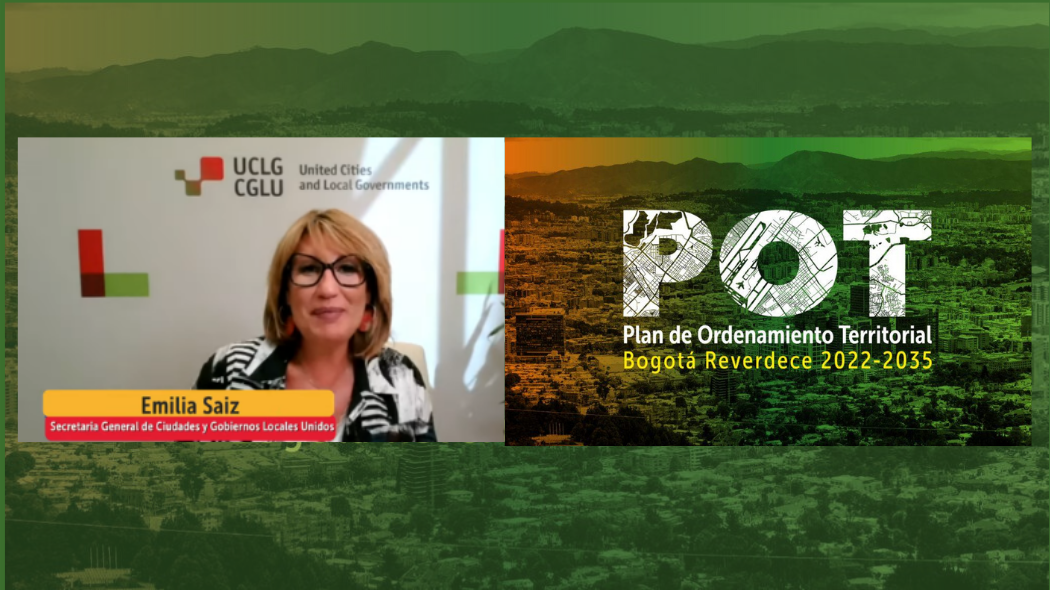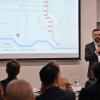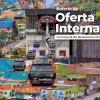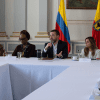On the occasion of the signing of the Master Plan 'Bogotá Reverdece 2022-2035' by Mayor Claudia López, through the Decree 555 of 2021 to deliver a new Master Plan to Bogotá, we share a text by Emilia Saiz, the director of the United Cities and Local Governments Network (UCLG), where she highlights the Colombian capital as an example for other cities in the world, for its strategies to make the care and welfare of its inhabitants the focus of its urban planning.
Bogotá is innovating with its Master Plan in response to major global development agendas
Bogotá's Master Plan challenges the New Urban Agenda and the 2030 Agenda, moving from the provision of public services to the provision of care services. In Bogotá, "new citizenships" are being created.
By Emilia Saiz, UCLG Secretary General
Bogotá's decision to prioritize "care" as a major stake in its development agenda, placing it at the center of urban planning is visionary and will allow the city to respond to its challenges, not only today but also in the future. The Master Plan offers an avant-garde and transformative possibility, moving from the provision of public services to the provision of care services. It is an innovative model change that, placing care not only as a city concept but also from a spatial and physical-territorial perspective, is being an example to be followed by the international community.
Understanding care as a global approach to public policy that integrates the provision of what is necessary for the health, well-being and protection of citizens is extraordinary because it not only builds community, but also brings us closer to more sustainable models. From UCLG, we see the care agenda as the articulator between the different agendas and as a unique vehicle to address the inequalities and lack of protection that afflict us and make our societies vulnerable to health and social crises, as well as turning us into predators of our ecosystems.
Cities such as Bogotá must set the tone in the change of model and value sustainability from the communities with their knowledge, wisdom and aspirations. Care societies built from the local level will allow us to address global challenges. This is the transforming axis that will make it possible to articulate a city that contributes to the fulfillment of the Sustainable Development Goals (SDGs) of the 2030 Agenda and the New Urban Agenda.
The Master Plan of Bogotá (POT) contributes to the debate that we raise from the global municipalism around the formation of a Pact for the Future that seeks to develop societies that have care as a fundamental pillar, reflecting on the urban transformation around the common objectives: action for people, for the planet, and for the Government.
This Pact, which will be consolidated over the next year, will expose more strongly the importance of cohesion and the local approach in the urban era. Above all, it will highlight the relevance of renewing social and environmental contracts from the territories, through a new empathetic and shared leadership to achieve the right to the city. We found in Bogota a valuable ally to shape this discussion.
During Venice Solutions 2030, an annual event that promotes progress towards the localization of the Sustainable Development Goals co-organized by AICCRE, UCLG, UN-Habitat, UNDP, UN SDGs Action Campaign, Platforma and the European Commission, we heard from the Secretary of Women of Bogotá about the System of Care and how this ambitious care agenda is changing the history of the city, achieving the territorialization of SDG 5 for Gender Equality. It is an admirable achievement.
Care must be considered as a transcendental link between local, regional and national governments, the private sector and academia. Therefore, this long-term vision proposed by a Master Plan such as that of Bogota, marks the transforming spirit that we can give to international development agendas from the local level.
We have an intergenerational responsibility that challenges us and cannot wait. If we want to empower boys and girls alike, we must start with care in all dimensions of planning.
This will allow us to create an international community that takes co-responsibility for the destiny of all, that frees the patents on vaccines and that considers the development agenda as a universal agenda that challenges rich and poor alike. Care transforms solidarity into security and good living by placing the human being at the center of politics in order to build fairer, greener and more equitable societies.
About UCLG
UCLG is the world's largest network of cities whose mission is to represent and defend the interests of local governments on the international stage. The network's members represent 5 billion people worldwide, 70% of the total world population. The network extends to every corner of the globe and encompasses more than 240,000 cities, regions and metropolises and more than 175 associations of local and regional governments in 140 countries.







